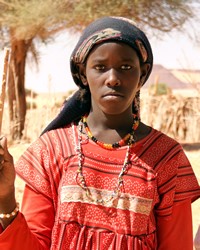Tubu, Teda in Nigeria

Photo Source:
Anonymous
|
Send Joshua Project a map of this people group.
|
| People Name: | Tubu, Teda |
| Country: | Nigeria |
| 10/40 Window: | Yes |
| Population: | 4,700 |
| World Population: | 160,600 |
| Primary Language: | Tedaga |
| Primary Religion: | Islam |
| Christian Adherents: | 0.00 % |
| Evangelicals: | 0.00 % |
| Scripture: | Translation Needed |
| Ministry Resources: | No |
| Jesus Film: | No |
| Audio Recordings: | Yes |
| People Cluster: | Kanuri-Saharan |
| Affinity Bloc: | Sub-Saharan Peoples |
| Progress Level: |
|
Introduction / History
The Teda are desert warriors living in the eastern and central Sahara Desert. The majority can be found in the Tibesti Mountains on the Libyan-Chad border, though a smaller number live in Niger and Nigeria. Their harsh environment, extreme poverty, and remote location make them a very tough people, who have often had violent clashes with the neighboring tribes.
Traditionally, the Teda controlled the caravan trade routes that passed through their territory. They were known for plundering these caravans and trading slaves. Stealing and killing are fairly acceptable in their culture and are even respected in some ways. In fact, their legal system approves acts of revenge and restitution.
Teda culture has little respect for those who do agricultural work. Reluctant to rely on cultivation, they depend on a flexible nomadic system for survival. Their property system favors mobility and military strength over securing land and farming it.
What Are Their Lives Like?
Because of their lack of interest in farming, most of the Teda are herdsmen. About one third are nomads; the rest are semi-nomadic. The semi-nomads move from place to place for eight or nine months, then returning to their villages during the rainy season. The Teda who farm do not practice crop rotation or use plows to cultivate the land. Some irrigation is always necessary for the crops, and animal manure is used as fertilizer. Milk from goats, sheep, and camels is a basic part of their diet. Those who farm grow vegetables, grains, fruits, legumes, and root crops. In addition, many Teda must hunt with dogs and gather wild fruits and seeds to further supplement their food supplies.
Livestock is the main source of wealth in Teda society. Camels and goats are the most common animals kept. The men are responsible for herding the camels, as well as for hunting and trading. Women tend to the goats and till the soil, but most farm work is done by slaves.
The Teda live in camps that consist of extended family members. The oldest man in the family has authority until his death. Marriages involve the payment of a substantial bride-price, which consists of livestock. Polygamy (having more than one spouse) is permitted, but rarely practiced. Most Teda communities have only a few hundred inhabitants. The more settled groups who live in the villages are not there for the whole year. Generally, they live in round huts with stone or mud walls. The huts have cone-shaped thatch roofs supported by a central post. The nomadic Teda often live in rectangular or oval-shaped tents that have wooden frames and mats made of palm leaves or animal skins. Sometimes, they use caves for shelter while looking for pasture.
Rough sports and violence are a regular part of life among the Teda. Although the man is usually the family leader, the wife may beat him if he challenges her authority in certain matters. Women usually carry daggers, and the men do not interfere in a fight between two women.
What Are Their Beliefs?
The Teda are virtually all Muslim. However, prior to their conversion, they were animists (believed that non-living objects have spirits). They converted to Islam in the 1800s, but only after almost 1000 years of contact with Arab Muslims. Their animistic background, however, seems to have been incorporated into their Muslim practices.
Today, the Teda follow the Islamic calendar, including fasting during the holy month of Ramadan. Both men and women faithfully say daily prayers, and more of them are now making pilgrimages to Mecca.
What Are Their Needs?
The Teda region has been politically sensitive because it harbored Muslim guerrilla forces who were fighting national governments. Additional laborers, evangelistic materials, and increased prayer efforts are needed to reach the Teda with the gospel.
Prayer Points
Ask the Lord to raise up additional workers to join the few who are working among the Teda people.
Ask the Holy Spirit to grant wisdom and favor to mission agencies focusing on the Teda.
Ask God to raise up an army of prayer warriors who will stand in the gap for the Teda people.
Pray that strong local churches will be raised up among the Teda leading to many being discipled in the ways of Jesus Christ.
Pray that believers will model Christ-like behavior that will give others a desire to live the abundant life that Jesus offers those who follow Him.